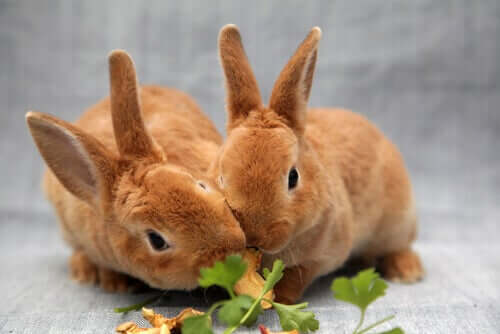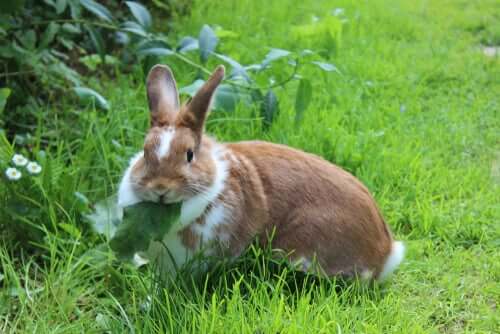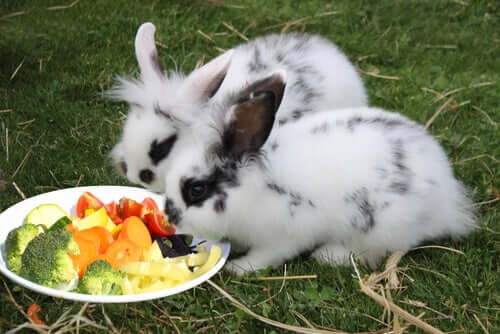Foods that Are Dangerous for Rabbits

Some foods can be toxic to rabbits or impossible for them to digest. This is true even for certain foods that seem harmless because they make up part of a rabbit’s diet. Therefore, it’s important to really understand this issue. So, today we’ll tell you all about foods that are dangerous for rabbits.
Vegetables, fruits, greens, and leaves are all normal parts of a rabbit’s diet. However, there are certain foods that you should limit.
1. Wild plants that can be dangerous for rabbits
Parsley and red clover
Parsley contains apiin, which in large doses can produce damage to a rabbits kidneys and liver. This and other components are what give parsley its diuretic effect. It’s true that parsley possesses a number of healthy properties – but in small quantities. For example, it’s a great source of vitamins and antioxidants, given its essentials oils, apiol and myristicin. However, it’s important to be careful about quantities.
As for red clover, it’s not a great option for rabbits since it produces gas. Therefore, if red clovers are part of your rabbit’s diet, make sure you always administer only small quantities, picking it before it produces flowers. Other wild plants can be very toxic – such as hemlock (Conium maculatum) and belladonna (Atropa belladonna)… and not only for rabbits.

2. Vegetables and greens that are dangerous for rabbits
Within a rabbit’s diet, it’s very important to include green leaves. This is especially true in regards to dark green leaves that contain a greater amount of nutrients, vitamins, and minerals. But some can be harmful if rabbits eat too much.
Spinach
Spinach is rich in vitamin A, folic acid, and iron. What’s more, it provides minerals like calcium, potassium, and magnesium. However, spinach also contains a large amount of calcium oxalate, which can turn out to be toxic. Very high quantities of spinach in a rabbit’s diet can produce calcium deposits in its urine as a result of an accumulation of this compound.
In the same way, you should avoid giving your rabbit large amounts of alfalfa, as it also contains an abundance of calcium.
Lettuce and greens
These are the foods that pet owners offer their rabbits the most. However, it’s important to take into account their water content and not overdo it. If rabbits eat too much, it can produce diarrhea – especially when it comes to iceberg lettuce. It’s important to be careful when giving lettuce to small rabbits. What’s more, greens can cause rabbits to have diarrhea and excess gas.
Potatoes
Raw potatoes — including their leaves and stems — are toxic for rabbits. If you boil the potato, then it’s okay for animals to eat. However, given their high starch content and caloric value, potatoes are still not a great idea for rabbits.
It’s important to pay special attention when it comes to potato seeds, as they are poisonous for rabbits.
Broccoli
Broccoli has a number of healthy properties and is a great antioxidant. However, it can also produce gases if you give a rabbit too much.
3. Fruit
In general, you should give rabbits fruit in small quantities because of how much water and sugar they contain. A diet based on an excess amount of fruits – more than 5% of a rabbit’s diet – can cause these animals to have diarrhea.

4. Low-quality dry rabbit food
Rabbit owners should ration the amount of dry rabbit food they offer their pets. It’s very common for people to make the mistake of only giving their rabbits dry food. However, a diet that consists exclusively of processed food can lead to health problems over time:
- Problems in the intestinal tract. These occur as a result of the high fiber content that the majority of dry rabbit foods contain.
- A lack of wear on a rabbit’s teeth. A rabbit’s teeth never stop growing, so they need to have foods that are rich in fiber in order to wear them down. Dental overgrowth is a very common problem in domestic rabbits.
- Obesity. Rabbit pellets are a very concentrated source of nutrition. Rabbits that eat too much on a daily basis may end up becoming obese over time.
- Calcium deposits in a rabbit’s urine. Dry rabbit good has a high concentration of calcium and other minerals that can remain in the bladder and develop into deposits.
The best plan of action is to offer your pet rabbit a diet that contains a variety of greens, vegetables, and hay, and small quantities of dry food. This, along with making sure rabbits always have access to fresh clean water, will help guarantee the health and longevity of your pet.
All cited sources were thoroughly reviewed by our team to ensure their quality, reliability, currency, and validity. The bibliography of this article was considered reliable and of academic or scientific accuracy.
- A. Reyes-Munguía, Zavala-Cuevas y A. Alonso-Martínez. Perejil (Petroselinum crispum): compuestos químicos y aplicaciones.
- Centro veterinario barbanza. Alimentación del conejo.
- La madriguera. Alimentación del conejo.